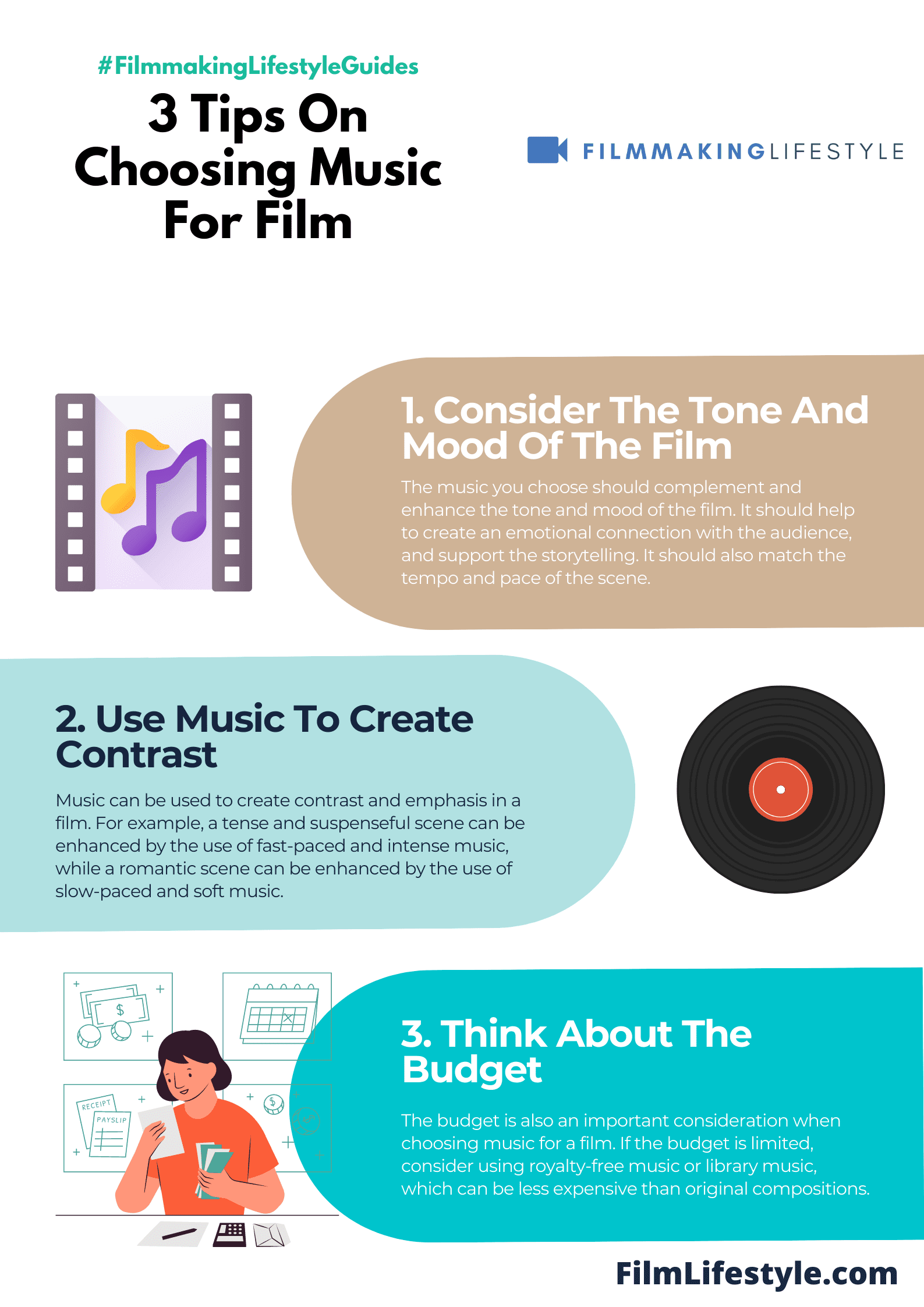Music shapes the soul of a film, setting the tone and driving the emotional current.
As directors, it’s our job to harness this power, ensuring every note aligns with our vision.
We’ll jump into the nuances of selecting the perfect score, from understanding character themes to the impact of rhythm and pacing.
Stay tuned as we explore the symphony of decisions that make a soundtrack unforgettable.
Understanding The Role Of Music In Film
Music in film isn’t just a backdrop to the visuals on screen.
It’s a powerful tool that directors wield to sculpt the emotional landscape of their storytelling.
The right music can amplify a scene’s impact, seamlessly blending with the narrative to enhance the cinematic experience.
Think of the suspenseful strings in Jaws or the sweeping melodies in Star Wars – without these scores, the films would feel incomplete.
Soundtracks and scores carry the weight of a film’s emotional resonance.
They serve multiple purposes, including:
- Establishing the setting and era,
- Accentuating character development,
- Signaling shifts in mood and tone,
- Foreshadowing events A director must thoroughly understand these functions to select music that will elevate the film. For instance, period films may Use music specific to the time, such as the use of 1950s rock ‘n’ roll in Back to the Future.
Choosing the right music involves a delicate balance between the narrative and the auditory elements.
Directors often collaborate with composers to ensure the score reflects the film’s vision and dynamics.
Our characters’ journeys are made all the more powerful with themes that resonate and reflect their growth, challenges, and triumphs.
Attention to detail in musical selection is crucial to the pacing of a film.
A high-speed chase might be underscored by rapid tempo music to heighten the urgency, while a slow, thoughtful piece could give viewers a moment to reflect during a poignant scene.
The subtlety of music’s role in pacing helps guide the audience’s emotional response throughout the movie.
Our understanding of music in film extends beyond just picking songs that fit.
It’s about weaving an auditory tapestry that complements the visuals and enriches the narrative.
This process is as creative and nuanced as the filmmaking itself, requiring a careful ear and a visionary approach to storytelling.
Choosing The Right Score For Your Film

When delving into the realm of cinema, directors must recognize that the selection of a score is not merely an item on a checklist – it’s a keystone in the arch of film production.
Partnering with a composer whose vision aligns with the movie can dramatically alter the final product.
A well-chosen score serves multiple purposes – it’s not simply background noise but a powerful storytelling tool.
It can propel the narrative forward, add layers of meaning, and provide emotional depth in scenes where dialogue falls short.

Understanding The Emotional Weight Of Each Scene
We weigh each scene’s emotional value, considering how music will enhance or subdue the desired sentiment.
For instance, a subtle string ensemble might underscore a delicate moment, while a thunderous orchestral piece could amplify a climactic battle.
Directors and composers must communicate effectively to ensure the score authentically reflects the film.
The Godfather with its iconic composition did not just set the tone of the movie but became a character itself resonating with viewers long after watching the film.
Functions Of A Film Score
Here are a few pivotal roles a score plays in a film:
- Establishing the overall mood or atmosphere,
- Representing psychological states of characters,
- Heightening the impact of key moments.
Strategic Use Of Leitmotifs
We often explore the use of leitmotifs – short, recurring musical phrases that are associated with specific characters or themes.
Star Wars skillfully utilizes leitmotifs to remind the audience of particular elements, ensuring continuity and a richer experience.
Selecting the right score involves deep reflection and an astute understanding of the film’s heartbeat.
Music should be thoughtfully woven into the fabric of the narrative, enhancing and echoing the journey onscreen.
Developing Character Themes
When crafting a film’s musical landscape, character themes play a crucial role.
They’re musical signatures that define and accompany film characters, shaping how audiences connect with their journeys.
Directors often collaborate closely with composers to develop these themes, ensuring that they fit seamlessly with the character’s arc and personality.
In films like The Lord of the Rings and Star Wars, character themes are used strategically to enhance the storytelling.
They reinforce the audience’s understanding of a character’s growth or challenges.
For example, the shift in a theme may signal a turning point in the character’s narrative or reflect their emotional evolution.
Subtlety is key when threading character themes throughout a film.
By weaving these musical threads into the fabric of the screenplay, we invite audiences to engage with the characters on a deeper level.
They’re not just listening to the music; they’re experiencing the interplay between the score and the story.
Character themes can also be utilized to:
- Establish connections between different characters,
- Uncover hidden layers of a character’s persona,
- Reinforce the impact of a character’s actions.
To ensure these themes resonate, we pay close attention to instruments, tempo, and harmony.
These elements help tailor the music to the character’s unique traits.
Whether it’s a powerful brass section for a heroic figure or a delicate piano melody for a more introspective character, these decisions are critical.
Besides, repetition with variation ensures themes remain fresh yet recognizable.
Like in Harry Potter, where the main motif evolves yet retains its core throughout the series.
It’s these thoughtful nuances in a character’s musical theme that enrich their presence on screen and anchor the audience’s emotional experience.
The Impact Of Rhythm And Pacing
We understand how the rhythm and pacing of a score are crucial elements in film production.
Just as the tempo of a song can control our heartbeat, the rhythm in a film score influences the pace at which viewers digest scenes.
It’s the pacing of the music that breathes life into the storyline, ensuring that every beat aligns with the narrative’s pulse.
Directors frequently leverage this to build tension or accelerate action.
In a chase scene, rapid tempos can make hearts race, while slower rhythms might be used in reflective moments to give the audience time to ponder.
The rhythm is not just a stylistic choice; it acts as the heartbeat of the film, setting the pace for how the story unfolds scene by scene.
The interplay between fast and slow rhythms also helps:
- Create dynamic contrasts – Evoke varied emotional responses – Guide audience expectations.
Harmony, another key element, works in tandem with rhythm.
It’s the harmony that offers emotional depth and complexity to scenes.
Minor chords might indicate sorrow or danger, while major chords can signify joy or triumph.
Directors and composers collaborate to ensure that the harmonic structure supports the film’s emotional journey.
Besides, changes in tempo and rhythm can signal shifts in the storyline.
When a character faces a pivotal decision or an unexpected event occurs, a sudden change in the musical tempo can underscore the significance of that moment.
The audience might not always be conscious of these shifts, but they feel them, deep within their cinematic experience.
The strategic use of rhythm and pacing ensures that the music is not merely accompanying the visuals but enhancing them.
Each frame is an opportunity to propel the narrative forward, and the rhythm of the score plays a foundational role in determining the impact of those moments.
It’s this meticulous crafting of the film’s rhythmical elements that creates a compelling auditory experience, moving us in sync with the characters and the story they tell.
Creating Emotional Arcs With Music
Music serves as the heartbeat of a film.
It breathes life into the narrative, shaping the emotional journeys of characters and eventually guiding how audiences feel and respond.
Crafting an emotional arc with music involves more than simply aligning crescendos with climactic scenes; it requires a nuanced understanding of the story’s emotional landscape and the ways in which different musical components can underscore and influence the unfolding drama.
We recognize that emotional arcs created by a score can follow the growth and transformation of characters, often without the audience realizing it.
For instance, an upbeat tempo at the start of a character’s journey might gradually shift into a darker, heavier melody as they confront challenges, before resolving back into an uplifted finale.
The arc isn’t just a storytelling device.
It’s a silent partner to the narrative unfolding on screen.
Directors and composers work together to highlight key points in the character’s journey –
- initial motifs that introduce a character’s theme,
- variations that reflect growth or change,
- a culmination of the theme that aligns with the character’s final arc.
It’s this collaboration that ensures each character’s musical motif evolves in tandem with their development within the story.
Noteworthy examples can be found in films like The Godfather where the iconic theme not only bookends the film but also weaves through the story, evolving as Michael Corleone’s character does.
Similar techniques are at play in Jurassic Park where the grandeur of the main theme reinforces the awe-inspiring nature of the park’s creatures, while subtler motifs accentuate the ensuing chaos and danger as the narrative unfolds.
Effective film scores can control the timing and intensity of emotional release.
Minor adjustments in harmonic progression can lead to significant emotional payoff.
For instance, delaying the resolution of a tense chord sequence until a pivotal scene completes promotes a more profound emotional impact than if the music had resolved earlier.
We understand that it’s not just about the notes that are played.
It’s about when they’re played and how they interact with the visuals on screen.
A carefully crafted score is attentive to the narrative’s highs and lows, using music to amplify the storytelling without overpowering it.
Musical Considerations For Directors – Wrap Up
We’ve explored the intricate dance between film scores and storytelling, revealing that music is much more than an auditory backdrop—it’s a vital narrative force.
Directors and composers must work in harmony to weave a score that resonates with the audience, subtly guiding them through the emotional landscape of the film.
As we craft these auditory journeys, we’re not just filling silence; we’re sculpting experiences that linger long after the credits roll.
Remember, the right music breathes life into every scene, turning our cinematic visions into unforgettable realities.
Frequently Asked Questions
What Is The Main Role Of A Film Score?
A film score primarily enhances the emotional impact and storytelling of a film by establishing mood, reflecting characters’ psychological states, and amplifying narrative moments.
How Does A Film Score Affect The Storytelling Experience?
A film score affects the storytelling experience by adding emotional depth, propelling the narrative, and heightening the impact of key moments through carefully crafted musical elements.
Can A Film Score Influence How Audiences Perceive A Character?
Yes, a film score can influence audience perception by using thematic musical cues or leitmotifs to represent a character’s psychological state and journey throughout the film.
What Are Leitmotifs, And How Do They Enhance A Film?
Leitmotifs are recurring musical themes associated with particular characters, situations, or ideas that enhance continuity and contribute to a richer, more cohesive viewing experience.
How Is The Collaboration Between Directors And Composers Important?
The collaboration between directors and composers is crucial for selecting music that authentically reflects the film’s narrative and emotional arcs, ensuring the score supports the director’s vision.
What Is The Role Of Harmonic Progression In A Film Score?
Harmonic progression in a film score controls the timing and intensity of emotional release, aligning with the narrative’s highs and lows and amplifying the overall storytelling impact.


